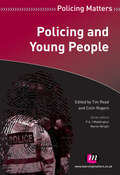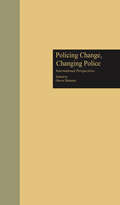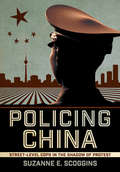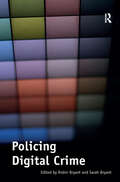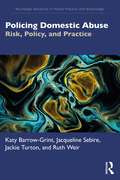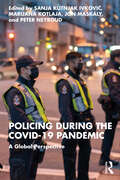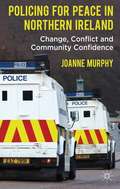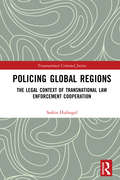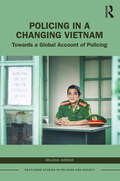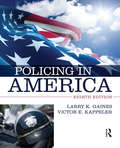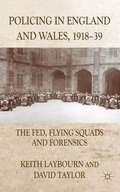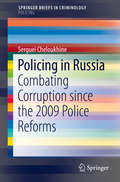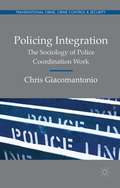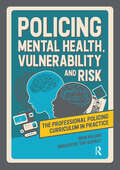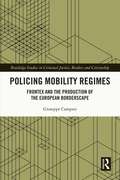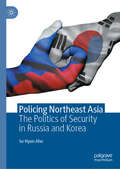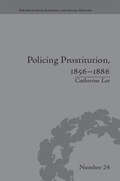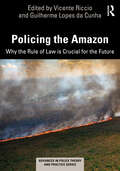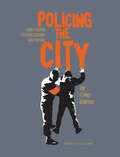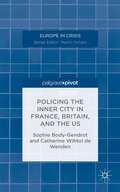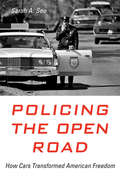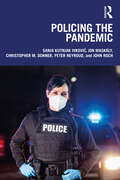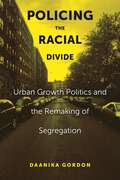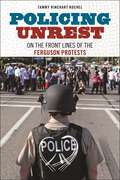- Table View
- List View
Policing and Young People (Policing Matters Series)
by P A J Waddington Martin Wright Tim Read Colin RogersAn accessible and up to date introduction to the key theme of policing and young people. This text gives a comprehensive overview of the issues involved in working with young people as offenders, suspects, witnesses, victims and citizens. It looks at perceptions of the young, and the role of the media in the context of current debates around anti-social behaviour, gangs and the family. The impact of multi-agency approaches on the way that young people are dealt with by the police and other agencies is considered, and additional chapters discuss police discretion and ethics, and safeguarding vulnerable young people.
Policing Change, Changing Police: International Perspectives (Current Issues in Criminal Justice #Vol. 14)
by Otwin MareninFirst published in 1996. In keeping with the other volumes in the Current Issues in Criminal justice series, this anthology is a prime example of joining readability and scholarship. Editor Otwin Marenin has thoughtfully commissioned and compiled an excellent group of essays on the role of police in changing societies by a very knowledgeable group of scholars. Moreover, Marenin has added substantially to the collection through his own insightful contributions.
Policing China: Street-Level Cops in the Shadow of Protest (Studies of the Weatherhead East Asian Institute, Columbia University)
by Suzanne E. ScogginsIn Policing China, Suzanne E. Scoggins delves into the paradox of China's self-projection of a strong security state while having a weak police bureaucracy. Assessing the problems of resources, enforcement, and oversight that beset the police, outside of cracking down on political protests, Scoggins finds that the central government and the Ministry of Public Security have prioritized "stability maintenance" (weiwen) to the detriment of nearly every aspect of policing. The result, she argues, is a hollowed out and ineffective police force that struggles to deal with everyday crime.Using interviews with police officers up and down the hierarchy, as well as station data, news reports, and social media postings, Scoggins probes the challenges faced by ground-level officers and their superiors at the Ministry of Public Security as they attempt to do their jobs in the face of funding limitations, reform challenges, and structural issues. Policing China concludes that despite the social control exerted by China's powerful bureaucracies, security failures at the street level have undermined Chinese citizens' trust in the legitimacy of the police and the capabilities of the state.
Policing Digital Crime
by Sarah Bryant Robin BryantBy its very nature digital crime may present a number of specific detection and investigative challenges. The use of steganography to hide child abuse images for example, can pose the kind of technical and legislative problems inconceivable just two decades ago. The volatile nature of much digital evidence can also pose problems, particularly in terms of the actions of the 'first officer on the scene'. There are also concerns over the depth of understanding that 'generic' police investigators may have concerning the possible value (or even existence) of digitally based evidence. Furthermore, although it is perhaps a cliché to claim that digital crime (and cybercrime in particular) respects no national boundaries, it is certainly the case that a significant proportion of investigations are likely to involve multinational cooperation, with all the complexities that follow from this. This groundbreaking volume offers a theoretical perspective on the policing of digital crime in the western world. Using numerous case-study examples to illustrate the theoretical material introduced this volume examine the organisational context for policing digital crime as well as crime prevention and detection. This work is a must-read for all academics, police practitioners and investigators working in the field of digital crime.
Policing Domestic Abuse: Risk, Policy, and Practice
by Katy Barrow-Grint Jacqueline Sebire Jackie Turton Ruth WeirThis book is dedicated to improving the practice of the policing of domestic abuse. Its objective is to help inform those working in policing about the dynamics of how domestic abuse occurs, how best to respond to and investigate it, and in the longer term how to prevent it. Divided into thematic areas, the book uses recent research findings to update some of the theoretical analysis and to highlight areas of good practice: &‘what works and why&’. An effective investigation and the prosecution of offenders are considered, as well as an evaluation of the success of current treatment options. Policing domestic abuse can only be dealt with through an effective partnership response. The responsibilities of each agency and the statutory processes in place when policy is not adhered to are outlined. Core content includes: A critique of definitions and theoretical approaches to domestic abuse, including coverage of the myths surrounding domestic abuse and their impact on policing. An exploration on the challenges of collecting data on domestic abuse, looking at police data and the role of health and victim support services. A critical review of different forms of abuse, different perpetrators and victims, and risk assessment tools used by the police. A critical examination of the law relating to domestic abuse; how police resources are deployed to respond to and manage it; and best practice in investigation, gathering evidence, and prosecution Key perspectives on preventing domestic abuse, protecting victims, and reducing harm. Written with the student and budding practitioner in mind, this book is filled with case studies, current research, reports, and media examples, as well as a variety of reflective questions and a glossary of key terms, to help shed light on the challenges of policing domestic violence and the links between academic research and best practice.
Policing during the COVID-19 Pandemic: A Global Perspective
by Sanja Kutnjak Ivković Marijana Kotlaja Jon Maskály Peter NeyroudProviding a global perspective on police adaptations to the COVID-19 pandemic, this book explores the extent of police organizational and operational changes in a number of countries as diverse as Brazil, China, South Africa, South Korea, the Philippines, Russia, the United Kingdom, and the United States. Bringing together a range of international experts, this book reflects on the changes in the broader social environment during the pandemic, examining the contours of police operational and organizational changes across several countries, analyzes the police enforcement of the government COVID-19 rules and regulations, explores the factors related to the COVID-19 effects on police officer wellness and safety, and studies police administrator, police officer, and citizen views about the potential consequences of organizational and operational changes on the interpersonal relations within police agencies and police–community partnerships. Policing During the COVID-19 Pandemic is essential reading for scholars and practitioners interested in exploring the police organizational adaptations, particularly in the times of emergencies, and the societal, cultural, and legal impacts of such adaptations. Sanja Kutnjak Ivković is Professor at the School of Criminal Justice, Michigan State University, USA. She is the Co-Editor of Policing: An International Journal. She is past Chair of the Division of International Criminology, American Society of Criminology, and past Chair of the International Division, Academy of Criminal Justice Sciences. Her co-authored and co-edited books on policing include: Exploring Contemporary Police Challenges, Police Code of Silence in the Times of Change, Police Integrity in South Africa, Exploring Police Integrity, Police Integrity across the World, Enhancing Police Integrity, Fallen Blue Knights, and The Contours of Police Integrity. Marijana Kotlaja is Assistant Professor in the Department of Criminal Justice and Criminology at the University of Missouri-Kansas City, USA. She is involved in evaluation research projects with many organizations, specifically focused on crime and place, and juvenile delinquency. She has led multiple international data collection efforts and has extensive knowledge of advanced quantitative methodology, including structural equation modeling, Bayesian analysis, and hierarchical linear models. She is the Secretary/Treasurer of the Division of International Criminology (American Society of Criminology), as well as the Editor of Around the Globe for the Criminologist. Jon Maskály is Assistant Professor in the Department of Criminal Justice at the University of North Dakota, USA. He won (with co-authors) the 2016 William L. Simon Outstanding Paper award from the Academy of Criminal Justice Sciences. His primary research interests revolve around issues in policing, notably police–community relations, police integrity, and police accountability. He has worked as a subject matter expert in several police reform projects around the nation. He has secured multiple contracts with police organizations to enhance their ability to make data-driven decisions. Peter Neyroud is Associate Professor in Evidence-Based Policing in the Jerry Lee Centre for Experimental Criminology, University of Cambridge, UK. He is the General Editor of the Oxford Journal Policing: A Journal of Policy and Practice. He set up and ran the UK National Policing Improvement Agency. He was commissioned by the UK Home Secretary to carry out a fundamental “Review of Police Leadership and Training,” which led to the establishment of the National “College of Policing.” He is the Co-Chair of the Campbell Collaboration Crime and Justice Coordinating Group.
Policing for Peace in Northern Ireland
by Joanne MurphyThis is the first in-depth analysis of the transition from the RUC to the PSNI seen through the eyes of key figures, inside and outside the organization. It provides a fresh insight into the wider social and political context in which this change occurred and is a significant contribution to the story of the Northern Ireland peace process.
Policing Global Regions: The Legal Context of Transnational Law Enforcement Cooperation (Transnational Criminal Justice)
by Saskia Maria HufnagelThis book provides a stocktake and comparative socio-legal analysis of law enforcement cooperation strategies in four different regions of the world: the European Union (EU), North America, Greater China and Australasia. The work analyses law enforcement cooperation mechanisms within the socio-legal framework of global normmaking. The strategies addressed range from legal frameworks facilitating cooperation to formal and informal police networks and cooperation practices. The study also takes into account crime-specific engagement, for example campaigns focusing on drug crimes, terrorism, financial crime, kidnappings and other offences. It explores challenges in policing practice and human rights protection in each region that could be countered by existing strategies in another. As regions usually develop more advanced cooperation mechanisms than exist at a global scale, strategies found in the former could help find solutions for the latter. To map existing strategies and assess their impact on both human rights and policing practice this study relies on an assessment of the primary and secondary literature sources in each region as well as interviews with practitioners ranging from senior police officers to prosecutors, government officials, customs and military staff. This book presents a valuable resource for academics and postgraduate students, as well as policing and criminal justice practitioners, government officials and policy makers.
Policing in a Changing Vietnam: Towards a Global Account of Policing (Routledge Studies in Policing and Society)
by Melissa JardineKnowledge about policing has been produced and disseminated unevenly so that our understanding comes from a skewed emphasis on the Anglo-American experience. Drawing on an original and comprehensive study of policing in Vietnam and engaging a Southern Criminological framework, this book explores police cultures and practices in a postcolonial, post-Confucian, transitioning economy. Identifying both similarities and differences in policing and police culture in Vietnam with those found in the dominant literature from the Global North, Policing in a Changing Vietnam challenges assumptions that police are (purportedly) apolitical, averse to tertiary education and defer to legalistic approaches to policing and law enforcement. It highlights that the variations identified in policing in Vietnam must be understood, not as deviations from Anglo-American normality, but as significant separate practices and traditions of policing from which the Global North may have something to learn. Contributing to ongoing debates on police culture and socialisation, this book explores the assumptions about relationships between the police, political systems, broad societal cultures, legal frameworks, organisations, communities and gender. An accessible and compelling read, this book will appeal to students and scholars of criminology, policing, gender studies, sociology, politics, law and all those who are interested in understanding the experiences and views of the Vietnamese police.
Policing in Africa
by David J. FrancisThis wide-ranging collection offers fresh insights into a critical factor in development and politics on the African continent. It critically examines and illustrates the centrality of policing in transition societies in Africa, and outlines and assesses the emergence and impact of the diversity of state and non-state policing agencies.
Policing in America
by Victor E. Kappeler Larry K. GainesIn the field of law enforcement in the United States, it is essential to know the contemporary problems being faced and combine that knowledge with empirical research and theoretical reasoning to arrive at best practices and an understanding of policing. Policing in America, Eighth Edition, provides a thorough analysis of the key issues in policing today, and offers an issues-oriented discussion focusing on critical concerns such as personnel systems, organization and management, operations, discretion, use of force, culture and behavior, ethics and deviance, civil liability, and police-community relations. A critical assessment of police history and the role politics played in the development of American police institutions is also addressed, as well as globalization, terrorism, and homeland security. This new edition not only offers updated research and examples, it also incorporates more ways for the reader to connect to the content through learning objectives, discussion questions, and "Myths and Realities of Policing" boxes. Video and Internet links provide additional coverage of important issues. With completely revised and updated chapters, Policing in America, Eighth Edition provides an up-to-date examination of what to expect as a police officer in America.
Policing in England and Wales, 1918-39
by Keith Laybourn David TaylorPolicing in England and Wales was transformed rapidly during the inter-war years (1918-1939) as a result of the threat of police strikes, the dramatic expansion of motor transport, and developments in forensic and detective work. The police strikes of 1918 and 1919 forced the British government to pass legislation which led to the formation of the Police Federation of England and Wales and the development of a pressure group for police officers, even though they did not have the right to strike. In the early 1930s there were pressures to make policing more professional through the use of forensic science as part of the expansion of the size and scope of detective work. Above all, the expansion of motorized road transport, with the consequent 'road holocaust ' of the 1930s, campaigns for road safety and against the 'road hogs' began to transform policing in England and Wales, not least because of the implications for manpower. These developments had implications for the relationship between the police officer and the motorist in which the police were less subservient than is often supposed. As a result policing in England and Wales was transformed rapidly from the Victorian and Edwardian emphasis upon the policeman's beat into the modern world of the forensic science, the control room and Q Cars.
Policing in Russia
by Serguei CheloukhinePolitical transitions often create new law enforcement challenges. This Brief provides an examination of such special law enforcement challenges in the Northern Caucasas, both due to the unique structure of the crime groups that are active in the region, and to the unique social and political environment in which they operate. In 2002, Russian President Vladamir Putin declared the end of the war in Chechnya. In 2006, he announced the insurgency was defeated. Yet today, Russia maintains a significant Internal Police presence in the Northern Caucasus to contain approximately 700 insurgents at a cost estimated to be more than the equivalent of $1 billion per year. Russian law enforcement, armed forces, and their local proxies are fighting irregular forces that operate in a manner akin to organized crime groups or terrorist cells. These groups have formed flexible networks which can sustain heavy losses, including the "decapitation" of their leaders, only to reconstitute themselves ready to fight another day. Beginning with a historical overview of the police and military structures in the region, this Brief provides a case study into the origins, structures, and unique strategies for counter-terrorism policing in these complex conditions. It also provides recommendations for the future, and a framework for understanding similar cases of terrorist operations in areas of political unrest, an increasing global threat.
Policing Integration: The Sociology of Police Coordination Work
by Chris GiacomantonioThis book critically examines coordination work between police officers and agencies. Police work requires constant interaction between police forces and units within those forces, yet the process by which police work with one another is not well understood by sociologists or practitioners. At the same time, the increasing inter-dependence between police forces raises a wide set of questions about how police should act and how they can be held accountable when locally-based police officers work in or with multiple jurisdictions. This rearrangement of resources creates important issues of governance, which this book addresses through an inductive account of policing in practice. Policing Integration builds on extensive fieldwork in a multi-jurisdictional environment in Canada alongside a detailed review of ongoing research and debates. In doing so, this book presents important theoretical principles and empirical evidence on how and why police choose to work across boundaries or create barriers between one another.
Policing Mental Health, Vulnerability and Risk (The Professional Policing Curriculum in Practice)
by Brian WilliamsPart of the Professional Policing Curriculum in Practice series, this text covers the important contemporary topic of policing those who may have poor mental health are classed as vulnerable or at risk, which runs throughout the policing curriculum.It examines how policing has evolved when dealing with vulnerable people and covers situations such as county lines, modern slavery and online bullying and harassment. It emphasises the importance of the overall police response as part of a multi-agency approach and promotes the need for individual professional curiosity from police officers. Case studies add to the rich knowledge base provided, and critical questions and examples of evidence-based practice are included to embed understanding and help cement theory. Students will develop their critical thinking abilities and gain the confidence to recognise and deal with the complex issues associated with this topic.
Policing Mobility Regimes: Frontex and the Production of the European Borderscape (Routledge Studies in Criminal Justice, Borders and Citizenship)
by Giuseppe CampesiMore than 30 years after its birth, the Schengen area of free movement is under siege in Europe: new barriers are being erected along land borders, military assets are increasingly deployed to patrol the Mediterranean, while sophisticated surveillance tools are used to keep track of the flows of people crossing into European space. Bringing together perspectives from political geography, critical criminology and legal theory, Policing Mobility Regimes offers a systematic analysis of the impact that Frontex is having on migration control strategies at the EU level and offers a detailed empirical description of the agency’s organization and operational activities. In addition, this book explores the meaning behind the attempt at developing a post-national border control strategy and what effect this might have on the geopolitics of Europe’s borders. It contributes to the wider theoretical debate on the relationships among migration, security and the transformation of borders in contemporary Europe. An accessible and compelling read, this book will appeal to all those engaged with criminology, sociology, geography, politics and law as well as all those interested in learning about Europe’s changing borders.
Policing Northeast Asia: The Politics of Security in Russia and Korea
by Se Hyun AhnThis book explores the progress in and the obstacles surrounding developing comprehensive security cooperation between Russia and South Korea since diplomatic relations were established in 1991 within the framework of economic security. The book focuses on oil and natural gas projects, linking the Trans-Siberian and Trans-Korean Railroads, industrial development in the Nakhodka Free Economic Zone, fishery cooperation, and the arms trade, and examines whether these five aspects of cooperation serve to contribute to building Russian-South Korean bilateral and regional economic security. The author argues that these five aspects of cooperation all have the potential to enhance comprehensive bilateral security and further regional economic security in Northeast Asia. However, Russian-South Korean economic cooperation has been hampered by a number of obstacles, including domestic factors as well as external factors, and prevented Russia and South Korea from fulfilling their potential for creating a cooperative comprehensive security relationship. The author concludes with an assessment on the utility of the concept of multi-dimensional security cooperation as a framework for studying and improving the prospects for Russian-South Korean bilateral relations.
Policing Prostitution, 1856–1886: Deviance, Surveillance and Morality (Perspectives in Economic and Social History #24)
by Catherine LeeFocusing on the ports, dockyards and garrison towns of Kent, this study examines the social and economic factors that could cause a woman to turn to prostitution, and how such women were policed.
Policing the Amazon: Why the Rule of Law is Crucial for the Future (Advances in Police Theory and Practice)
by Vicente Riccio Guilherme Lopes da CunhaThis edited collection discusses the rule of law in the Amazon and the capabilities of the region’s sovereign states to police their territory considering security matters. Comprised of nine countries, including a European Union member, the Amazon region features states facing political instability, poverty, social inequalities, high levels of corruption, and lack of trust by their populations. This context is aggravated by the presence of criminal organizations operating there and shaping transnational bonds. Notably, the world’s foremost cocaine-producing countries—Colombia, Peru, and Bolivia—are located in the region, presenting related turmoil and instability. Moreover, as home to the largest rainforest on Earth and the widest biodiversity, the region is an object of concern due to environmental reasons. The protection of these natural resources as well as the traditional peoples living there is intertwined with issues of development, security, and policing.The book delves into questions on the international agenda, such as: how is it possible to sustain the rule of law in the Amazon? What are the states’ capabilities for controlling the territory and enforcing the law? How do these states deal with the growing urban violence in the region? What are the capabilities of public authorities for proposing laws and policies, and judicial systems to process, prevent, and suppress different crimes such as drug dealing, smuggling, human trafficking, terrorism, and environmental crimes?The book fills a gap in English-language scholarship exploring the context of the rule of law in the Amazon and the impact on policing activities. It is ideal for a wide range of audiences, including policing scholars, law enforcement and community leaders, and students focusing on criminal justice and the Amazon.
Policing the City: An Ethno-graphic
by Didier Fassin Frédéric DebomyAdapted from the landmark essay Enforcing Order, this striking graphic novel offers an accessible inside look at policing and how it leads to discrimination and violence.What we know about the forces of law and order often comes from tragic episodes that make the headlines, or from sensationalized versions for film and television. These gripping accounts obscure two crucial aspects of police work: the tedium of everyday patrols under constant pressure to meet quotas, and the banality of racial discrimination and ordinary violence. Around the time of the 2005 French riots, anthropologist and sociologist Didier Fassin spent fifteen months observing up close the daily life of an anticrime squad in one of the largest precincts in the Paris region. His unprecedented study, which sparked intense discussion about policing in the largely working-class, immigrant suburbs, remains acutely relevant in light of all-too-common incidents of police brutality against minorities. This new, powerfully illustrated adaptation clearly presents the insights of Fassin&’s investigation, and draws connections to the challenges we face today in the United States as in France.
Policing the Inner City in France, Britain, and the US
by Sophie Body-Gendrot Catherine Wihtol de WendenThis book analyzes and compares the police's inner city presence in France, the US, and Britain. Its authors' research points to the idea that the creation of a more inclusive environment is a sound approach for cities looking to better maintain peace, reduce discrimination, and manage the dynamic between police and citizens in inner cities.
Policing the Open Road: How Cars Transformed American Freedom
by Sarah A. SeoSarah Seo shows that the rise of the car, the symbol of American personal freedom, led to ever more intrusive policing, with devastating consequences for racial equality in our criminal justice system. Criminal procedures designed to safeguard us on the road undermined the nation’s commitment to equal protection before the law.
Policing the Pandemic
by Peter Neyroud Sanja Kutnjak Ivković Jon Maskály Christopher M. Donner John RochPolicing the Pandemic explores how police agencies in United Kingdom and the United States have adjusted to their changing environments, both during the peak of the COVID-19 pandemic and later, when the restrictions have been relaxed and the societies have begun to develop their new normal.Combining interviews and surveys of police officers and police administrators from the United Kingdom and the United States, this book provides a systematic and empirically based account of these changes and elaborates on the lessons for the future. The book offers insight into organizational and operational changes brought on by the pandemic, including the changes in their workload, enforcement activities, and administrative changes. It examines police perceptions of, and compliance with, pandemic-related changes, any potential COVID-19-related training, and the frequency with which they used various responses when observing violations of COVID-19 regulations and laws. It also focuses on police officers’ own fear of contracting COVID-19, whether they had been diagnosed with COVID-19, and how the pandemic affected their own health, stress, and general well-being.This book is an essential reading for scholars, policymakers, and police administrators tackling issues such as procedural justice, organizational change, and police officer well-being, as well as those more widely engaged with societal and legal consequences of the pandemic, be it the COVID-19 pandemic or any future pandemics.
Policing the Racial Divide: Urban Growth Politics and the Remaking of Segregation
by Daanika Gordon2023 Edwin H. Sutherland Book Award WinnerA behind-the-scenes account of the harsh realities of policing in a segregated city For thirteen months, Daanika Gordon shadowed police officers in two districts in “River City,” a profoundly segregated rust belt metropolis. She found that officers in predominantly whiteneighborhoods provided responsive service and engaged in community problem-solving, while officers in predominantly Black communities reproduced long-standing patterns of over-policing and under-protection. Such differences have marked US policing throughout its history, but policies that were supposed to alleviate racial tensions in River City actually widened the racial divides. Policing the Racial Divide tells story of how race, despite the best intentions, often dominates the way policing unfolds in cities across America.Drawing on in-depth interviews and hundreds of hours of ethnographic observation, Gordon offers a behind-the-scenes account of how the police are reconfiguring segregated landscapes. She illuminates an underexplored source of racially disparate policing: the role of law enforcement in urban growth politics. Many postindustrial cities are increasing the divisions of segregation, Gordon argues, by investing in downtowns, gentrified neighborhoods, and entertainment corridors, while framing marginalized central city neighborhoods as sources of criminal and civic threat that must be contained and controlled. Gordon paints a sobering picture of modern-day segregation, and how the police enforce its racial borders, showing us two separate, unequal sides of the same city: one where rich, white neighborhoods are protected, and another where poor, Black neighborhoods are punished.
Policing Unrest: On the Front Lines of the Ferguson Protests
by Tammy Rinehart KochelAn up-close account of policing during the Ferguson protests, providing insights from both police officers and members of the communityPolicing Unrest presents the frontline experiences of police officers during the intense three weeks of protest, vigils, looting, violence, and large civil demonstrations in and around Ferguson, Missouri, following the fatal shooting of Michael Brown by a police officer. Looking closely at the lived experiences of police officers and community residents, Tammy Rinehart Kochel raises important questions about police-community relations and the role of police as peacekeepers in support of social justice.Drawing on interviews with dozens of police personnel who policed the protests, Kochel offers insight into their shared experiences and provides compelling personal accounts of how they performed their jobs during the protest. The book covers a range of topics such as police-community relationships and community policing principles; how factors such as police subculture and organizational culture stacked up against social identity during this crisis; the role of an officer’s characteristics, especially an officer’s race, play in an officer’s self-legitimacy; and the implications for police recruitment and training. Kochel’s unique access allowed her to provide a balanced perspective on police officers’ cynicism and public protests against police that were rampant in the year following Ferguson against the need to restore police-community relations and police legitimacy through increased transparency, accountability, and procedural justice. Policing Unrest explains how the Ferguson protests ushered in an era of police reform and reveals what it is like being a police officer facing public unrest, particularly in the wake of widely publicized incidents of police brutality around the country.
